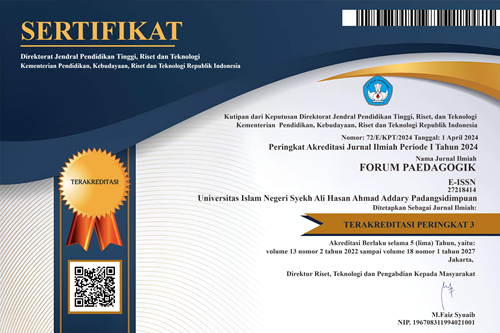ISLAMIC EDUCATION ENVIRONMENT IN THE PERSPECTIVE OF HADITH AND ITS IMPLICATIONS FOR STUDENT DEVELOPMENT
Education is always changing from one era to the next, and Islam is a religion that can make an integral contribution to the education of the whole human being, especially those related to interactions with their environment. This already exists in Islamic teachings, including the Prophet himself who once said about this educational environment. Therefore the purpose of this study is to describe the Islamic Education Environment in the Hadith Perspective and Its Implications for Student Development. The study uses a descriptive qualitative method with a literature study approach. The results of the study show that the Islamic Education Environment in the Hadith Perspective includes the family environment which is the first environment for students either before or after they are born. He greatly influenced the selection of aqidah for the future due to his parents. Then the school environment, whether formal or non-formal, is further education for students after being in the family. He influences determining professionalism at work in the future. And the last is the community environment which is a practice place for students to apply their knowledge. He will contribute to creating peace in their midst so that baldatun thoyyibatun warobbun ghofur is created.
Keywords : Educational Environment,;Islam,; Hadith Perspective; Students
Afriani, D. A. (2019). Pelaksanaan Pendidikan Agama Islam di Lingkungan Keluarga, Sekolah dan Masyarakat. An Educational Journal Zirah, 1(1), 99–105.
Al-Nahlawi, A. al-R. (1997). Ushul al-Tarbiyah al-Islamiyah wa Asalibuha. Darul Fikr.
Bukhari, U. (2012). Hadis Tarbawi Pendidikan dalam Perspektif Hadis. Amazah.
Daradjat, Z. (1995). Pendidikan Islam Dalam Keluarga dan Sekolah. Ruhana.
Ginanjar, M. H. (2013). Urgensi Lingkungan Pendidikan sebagai Mediasi Pembentukan Karakter Peserta Didik. Edukasi Islami: Jurnal Pendidikan Islam, 02(04), 376–396.
Hasbullah. (2018). Lingkungan Pendidikan dalam Al-Qur’an dan Hadis. Tarbawi: Jurnal Keilmuan Manajemen Pendidikan, 4(1), 13–26.
Mujib, A., & Mudzakkir, J. (2006). Ilmu pendidikan Islam. Kencana Prenada Media Group.
Nata, A. (1997). Filsafat Pendidikan Islam. Logos Wacana Ilmu.
Nata, A. (2010). Ilmu Pendidikan Islam. Kencana.
Nurhuda, A. (2022a). Nilai Pendidikan Karakter Dalam Film Layangan Putus 1a Produksi Md Entertainment. Jurnal Pendidikan Sosiologi dan Humaniora, 13(1), 33. https://doi.org/10.26418/j-psh.v13i1.52107
Nurhuda, A. (2022b). PERAN DAN KONTRIBUSI ISLAM DALAM DUNIA ILMU PENGETAHUAN. Jurnal Pemikiran Islam, 2(2), 222–232.
Nurhuda, A. (2023a). Islamic Education in the Family : Concept , Role , Relationship , and Parenting Style. 2(4), 359–368.
Nurhuda, A. (2023b). Obligation to Learn and Search Science from the Perspective of the Prophet’s Hadits. Edunity: Social and Educational Studies, 2(3), 405–415.
Nurhuda, A. (2023c). PROPHETIC MISSION AND ISLAMIC EDUCATION IN SURAH SABA’: 28 AND AL-ANBIYA’: 107. 4(1), 108–116.
Nurhuda, A., Ansori, I. H., & Ab, T. E. S. B. E. (2023). THE URGENCY OF PRAYER IN LIFE BASED ON THE AL-QUR’AN PERSPECTIVE. LISAN AL-HAL: Jurnal Pengembangan Pemikiran dan Kebudayaan, 17(1), 52–61.
Nurhuda, A., & Putri, Y. (2023). The Urgence of Teacher’s Example for Student Education in School. Journal Corner of Education, Linguistics, and Literature, 2(3), 250–257.
Nurhuda, A., Susanti, L., Azmi, Y. S., & Ulama, U. N. (2023). Psychological and Physiological Motives in Humans (Study on Verses of The Qur’an). 35(1), 30–44. https://doi.org/10.23917/suhuf.v35i1.22581
Putri, Y., & Nurhuda, A. (2023). Filsafat Pemikiran Pendidikan Islam Lintas Zaman. PT Sonpedia Publishing Indonesia. https://books.google.co.id/books?hl=id&lr=&id=Zaq0EAAAQBAJ&oi=fnd&pg=PP1&dq=filsafat+pendidikan+islam+lintas+zaman&ots=EG0Wtjp8yd&sig=TX4dGf4hQP56wHEP5FFjc2mb98Y&redir_esc=y#v=onepage&q=filsafat pendidikan islam lintas zaman&f=false
Ramayulis. (2008). Ilmu Pendidikan Islam. Kalam Mulia.
S, L. (2018). Konsep Pendidikan Keluarga dalam Perspektif Al-Qur’an dan Hadis. Jurnal Pendidikan Agama Islam, 15(1), 50–64.
Shihab, M. Q. (1993). Membumikan al-Qur’an : fungsi dan peran wahyu dalam kehidupan masyarakat. Mizan.
Tafsir, A. (2010). Filsafat Pendidikan Islam. PT REMAJA ROSDAKARYA.
 Copyright (c) 2023 Yasin Syafii Azami, Abid Nurhuda, Thariq Aziz, Muhammad Al Fajri
Copyright (c) 2023 Yasin Syafii Azami, Abid Nurhuda, Thariq Aziz, Muhammad Al Fajri

This work is licensed under a Creative Commons Attribution-ShareAlike 4.0 International License.











